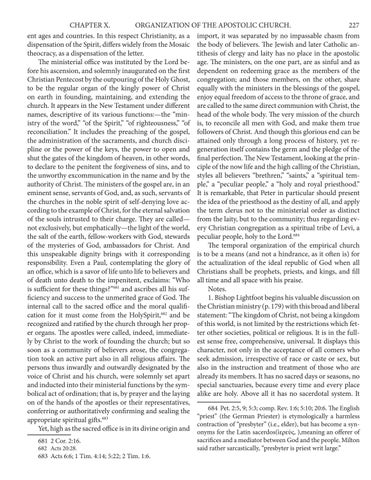CHAPTER X. ORGANIZATION OF THE APOSTOLIC CHURCH. 227 ent ages and countries. In this respect Christianity, as a import, it was separated by no impassable chasm from dispensation of the Spirit, differs widely from the Mosaic the body of believers. The Jewish and later Catholic antheocracy, as a dispensation of the letter. tithesis of clergy and laity has no place in the apostolic The ministerial office was instituted by the Lord be- age. The ministers, on the one part, are as sinful and as fore his ascension, and solemnly inaugurated on the first dependent on redeeming grace as the members of the Christian Pentecost by the outpouring of the Holy Ghost, congregation; and those members, on the other, share to be the regular organ of the kingly power of Christ equally with the ministers in the blessings of the gospel, on earth in founding, maintaining, and extending the enjoy equal freedom of access to the throne of grace, and church. It appears in the New Testament under different are called to the same direct communion with Christ, the names, descriptive of its various functions:—the “min- head of the whole body. The very mission of the church istry of the word,” “of the Spirit,” “of righteousness,” “of is, to reconcile all men with God, and make them true reconciliation.” It includes the preaching of the gospel, followers of Christ. And though this glorious end can be the administration of the sacraments, and church disci- attained only through a long process of history, yet repline or the power of the keys, the power to open and generation itself contains the germ and the pledge of the shut the gates of the kingdom of heaven, in other words, final perfection. The New Testament, looking at the printo declare to the penitent the forgiveness of sins, and to ciple of the now life and the high calling of the Christian, the unworthy excommunication in the name and by the styles all believers “brethren,” “saints,” a “spiritual temauthority of Christ. The ministers of the gospel are, in an ple,” a “peculiar people,” a “holy and royal priesthood.” eminent sense, servants of God, and, as such, servants of It is remarkable, that Peter in particular should present the churches in the noble spirit of self-denying love ac- the idea of the priesthood as the destiny of all, and apply cording to the example of Christ, for the eternal salvation the term clerus not to the ministerial order as distinct of the souls intrusted to their charge. They are called— from the laity, but to the community; thus regarding evnot exclusively, but emphatically—the light of the world, ery Christian congregation as a spiritual tribe of Levi, a the salt of the earth, fellow-workers with God, stewards peculiar people, holy to the Lord.684 of the mysteries of God, ambassadors for Christ. And The temporal organization of the empirical church this unspeakable dignity brings with it corresponding is to be a means (and not a hindrance, as it often is) for responsibility. Even a Paul, contemplating the glory of the actualization of the ideal republic of God when all an office, which is a savor of life unto life to believers and Christians shall be prophets, priests, and kings, and fill of death unto death to the impenitent, exclaims: “Who all time and all space with his praise. is sufficient for these things?”681 and ascribes all his sufNotes. ficiency and success to the unmerited grace of God. The 1. Bishop Lightfoot begins his valuable discussion on internal call to the sacred office and the moral qualifi- the Christian ministry (p. 179) with this broad and liberal cation for it must come from the HolySpirit,682 and be statement: “The kingdom of Christ, not being a kingdom recognized and ratified by the church through her prop- of this world, is not limited by the restrictions which feter organs. The apostles were called, indeed, immediate- ter other societies, political or religious. It is in the fullly by Christ to the work of founding the church; but so est sense free, comprehensive, universal. It displays this soon as a community of believers arose, the congrega- character, not only in the acceptance of all comers who tion took an active part also in all religious affairs. The seek admission, irrespective of race or caste or sex, but persons thus inwardly and outwardly designated by the also in the instruction and treatment of those who are voice of Christ and his church, were solemnly set apart already its members. It has no sacred days or seasons, no and inducted into their ministerial functions by the sym- special sanctuaries, because every time and every place bolical act of ordination; that is, by prayer and the laying alike are holy. Above all it has no sacerdotal system. It on of the hands of the apostles or their representatives, 684 Pet. 2:5, 9; 5:3; comp. Rev. 1:6; 5:10; 20:6. The English conferring or authoritatively confirming and sealing the “priest” (the German Priester) is etymologically a harmless appropriate spiritual gifts.683 contraction of “presbyter” (i.e., elder), but has become a synYet, high as the sacred office is in its divine origin and onyms for the Latin sacerdos(ἱερεύς, ),meaning an offerer of 681 2 Cor. 2:16. 682 Acts 20:28.
683 Acts 6:6; 1 Tim. 4:14; 5:22; 2 Tim. 1:6.
sacrifices and a mediator between God and the people. Milton said rather sarcastically, “presbyter is priest writ large.”







